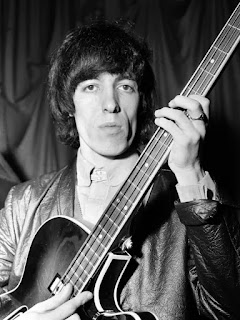What's a bass player to do?
Sometimes there is nothing to do but nothing. Not all music needs a bass part--or one for the entire piece. Solo acoustic guitars usually don't need octave doubling in the lower register, as the amplification creates enough boominess. The low end of guitar shares the same range as the cello, one of the bass voices of an orchestra, along with the double bass an octave lower, literally doubling the bass.
It's nice if a bass part has some kind of contrapuntal relationship with the vocal. Jaco Pastorius played some great parts on Joni Mitchell's songs on the Shadows and Light tour (1980). (Check out Edith and the Kingpin and Goodbye Pork Pie Hat). Generally Jaco always sounded better when in his sideman role, but it was a rarity. Busy bass lines work when joined at the hip with drums and percussion, and his staccato style worked well with that, but he often stretched it a bit too thin, which I realize now when I go back and listen to his performances. But he really had a gift for bass-as-voice, as opposed the obligatory sound tacked at the bottom.
Bass guitars are guitars after all and can function as such in the upper register. Some of the "guitary" bass players like Steve Swallow and Jeff Berlin are almost the antithesis of bass as a functional instrument with free soloing and comping in that range. Why not have keyboards and guitars handle that?
As much as I admire virtuoso bassists, I still think the primary role of a bassist (at least in a pop music setting) is to support the songs. After I started writing songs, the bass was sometimes the easiest to play, but hardest to conceive. Sometimes songs don't need a continuous bass line, or one at all, or one played on a bass guitar or acoustic bass. Sometimes I would take radical approaches like alternate tunings to try something new.
Jazz bass parts are typically in a higher register--more in the range of the low register of a guitar. James Jamerson's parts had a kind of buoyancy with the lower notes pinging off the high notes, typical of the ghost notes and grace notes played on an acoustic bass. The isolated tracks for his parts are interesting to analyze, because you can hear him reacting to the other parts in real time. It would be interesting to hear what he was playing against in his overdub, if in fact it was overdubbed at all.
Bass as an object
Bass fills a space very easily and is palpable. It easily passes through objects and resonates with them, most importantly the human body. You can massage with bass frequencies and you can hack the beat of the heart.
Here are a few strategies for composing bass lines:
- Don't play (or play phantom bass with the instrument muted)
- Leave space
- Use ranges (tessitura)
- Retune
- Play on 1, 2 or 3 strings
- Play bass on a synth or organ
- On a 5-string bass, treat it like a transposing instrument. If you view the instrument as sounding down a perfect 4th, from E to B, play everything up a 4th and think in the key a fourth higher.
- Ignore the G string.



Comments